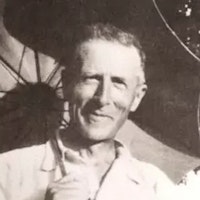Love alone is capable of uniting living beings in such a way as to complete and fulfill them…
Pierre Teilhard de Chardin

Love Alone
Topic: Love, Compassion, & Kindness
Love alone is capable of uniting living beings in such a way as to complete and fulfill them, for it alone takes them and joins them by what is deepest in themselves. All we need is to imagine our ability to love developing until it embraces the totality of men and the earth.
Pierre Teilhard de Chardin was a French Jesuit priest, paleontologist, theologian, philosopher, and teacher. He was born on May 1, 1881, in Sarcenat, France. He studied geology and paleontology at the University of Paris, and was ordained a priest in 1911.
During World War I, Teilhard served as a stretcher bearer on the front lines. He was decorated for his bravery, and his experiences in the war led him to develop a new understanding of the relationship between science and religion. He believed that evolution was a process of spiritual as well as biological transformation, and that humanity was evolving towards a final spiritual unity. He coined the term "Omega Point" to describe this final spiritual unity.
After the war, Teilhard taught at the Catholic Institute of Paris. He also traveled to China, where he participated in the discovery of Peking Man. In the 1930s, he traveled to other parts of Asia, including the Gobi Desert, Sinkiang, Kashmir, Java, and Burma.
Teilhard's writings were controversial, and he was not allowed to publish his work in the Catholic Church until after his death. However, his ideas have since been published and translated into many languages. His ideas have been praised by some for their insights into the relationship between science and religion, but they have also been criticized by others for being too optimistic or even heretical.
Teilhard de Chardin was a brilliant and passionate thinker, and his work continues to be influential and thought-provoking. He was a pioneer in the field of evolutionary theology, and his ideas have helped to shape the way we think about the relationship between science and religion.
The Phenomenon of Man
De Chardin, Pierre Teilhard. The Phenomenon of Man. Translated by Bernard Joseph Wall, Harper Torchbooks, The Cloister Library, Harper & Row, Publishers, 1961.

Pierre Teilhard de Chardin
Theme: Love

About Teilhard de Chardin’s Vision of Love and Unity [Commentary]
The Phenomenon of Man
The Phenomenon of Man (Le phénomène humain) is a 1955 book written by the French philosopher, paleontologist and Jesuit priest Pierre Teilhard de Chardin. In this work, Teilhard describes evolution as a process that leads to increasing complexity, culminating in the unification of consciousness.
Additional Pierre Teilhard de Chardin Quotes
Resources
Related Quotes
Copyright © 2017 – 2026 LuminaryQuotes.com About Us